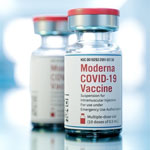By Marie Rosenthal
In a unanimous vote, 19 members of the FDA Vaccines and Related Biological Products Advisory Committee recommended boosters for the Moderna COVID-19 vaccine.

The recommendation will affect a large group of people in the United States. VRBPAC voted to recommend an expansion of Moderna’s emergency use authorization (EUA) for its messenger RNA (mRNA) vaccine for those who are:
- 65 years and older;
- 18 to 64 years of age with a high risk for severe COVID-19; and
- 18 to 64 years of age with an institutional or occupational risk for SARS-CoV-2 that puts them at high risk for serious complications of COVID-19, including severe COVID-19.
This is the same recommendation made for the Pfizer-BioNTech mRNA vaccine.
The Moderna booster should be given at least six months after the two-dose primary series. In addition, if granted, the Moderna booster dose would be half the dose used for the primary series: 50 versus 100 mcg.
Jacqueline Miller, MD, FAAP, the senior vice president and therapeutic area head of infectious diseases at Moderna, presented data about the long-term efficacy of the primary series, which included more than 30,000 people who received at least one dose: 15,180 who received the mRNA vaccine and 15,166 people who received placebo. Once the study was unblinded, the placebo patients could receive the mRNA vaccine, and the data presented looked at long-term immunity in people given the vaccine early and those given it later.
They found the vaccine was 93.2% effective at preventing COVID-19 disease and 98.2% effective at preventing severe disease through 5.3 months of follow-up. Although rare, there were breakthrough cases, and the incidence rates were higher in the group vaccinated earlier than the group vaccinated later (77.1 vs. 49 COVID-19 cases per 1,000 person-years).
Neutralizing antibody titers had waned prior to boosting, particularly against variants of concern, at approximately six months, Dr. Miller noted.
The panel criticized the lack of booster data specific to the Moderna vaccine. Although the vaccine has been given to millions of people under the EUA, data were included in the submission from P201, a phase 2 trial that looked at people who received a two-dose 50-mg series and a 50-mcg booster (n=173), a 100-mg series (what is currently authorized) and a 50-mcg booster (n=171). Most of the people (96%) were white.
The company evaluated immunogenicity in only 149 people who received the 100-mg series plus the booster, and safety in only 171 who received the primary series before receiving the booster.
A booster dose at the 50-mcg level boosted neutralizing titers significantly above the phase 3 benchmark. After a booster dose, a similar level of neutralizing titers was achieved across age groups, notably in older adults (ages 65 and above). Those who were given a booster saw an increase in geometric mean titers 28 days after the booster.
The safety profile following the booster dose was similar to that observed previously for dose 2 of mRNA-1273. Moderna did not find any serious adverse events related to the booster.
The committee also heard updated information from Israel, where more than 3 million booster doses have been given. However, that data concerned the Pfizer-BioNTech vaccine, not the Moderna vaccine.
“I had real issues with this vote,” said Patrick Moore, MD, who explained why he voted yes despite his reservations. “[It was] more gut feeling rather than based on really, truly serious data.”
He added that companies coming before the panel really need to “take seriously” the panel’s concerns about a lack of “solid data, and it needs to be explained well, which to be honest with you, this submission to me, at least, was not explained well until I read the FDA review.”
Although the data were not strong, he said they supported the vote.
The FDA does not have to abide by the committee’s recommendation, but it usually does.
After the vote, the committee was asked to consider whether everyone 18 years of age and older should receive a booster dose. Overall, the committee was disinclined to see this happen. More data would be needed about the need, efficacy and safety of vaccination in healthy, younger people, they said.
{RELATED-HORIZONTAL}